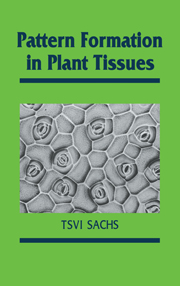Book contents
- Frontmatter
- Contents
- Preface
- 1 Introduction
- 2 Interactions of developing organs
- 3 Hormones as correlative agents
- 4 Callus and tumor development
- 5 The polarization of tissues
- 6 The canalization of vascular differentiation
- 7 Cell lineages
- 8 Stomata as an example of meristemoid development
- 9 Expressions of cellular interactions
- 10 Apical meristems
- 11 The localization of new leaves
- 12 A temporal control of apical differentiation
- 13 Generalizations about tissue patterning
- References
- Author Index
- Subject Index
10 - Apical meristems
Published online by Cambridge University Press: 05 October 2009
- Frontmatter
- Contents
- Preface
- 1 Introduction
- 2 Interactions of developing organs
- 3 Hormones as correlative agents
- 4 Callus and tumor development
- 5 The polarization of tissues
- 6 The canalization of vascular differentiation
- 7 Cell lineages
- 8 Stomata as an example of meristemoid development
- 9 Expressions of cellular interactions
- 10 Apical meristems
- 11 The localization of new leaves
- 12 A temporal control of apical differentiation
- 13 Generalizations about tissue patterning
- References
- Author Index
- Subject Index
Summary
Apical meristems are the site of the continued embryonic development that is an outstanding feature of plants. It is in them that organogenesis and the formation of new cellular patterns occur. It follows that an understanding of the development of form requires an understanding of the organization of meristems: it is necessary to seek structural subdivisions and controls that determine the orderly occurrence of developmental events.
Much of the organization of apical meristems must depend on processes internal to the meristems themselves (Ball, 1952; Buvat, 1955; Cutter, 1965; Steeves and Sussex, 1972). This is to be expected on the basis of the scale of the events, which would require detailed, fine-grained information if it were to be imposed by the environment or the rest of the plant (Chapter 1). The internal basis of organization is further suggested, if not proven, by the common development of new or adventitious meristems in unusual locations and even on unorganized callus. Furthermore, meristems develop normally when isolated by severe cuts (Wardlaw, 1952) and in culture (Murashige, 1974). These are conditions in which detailed organized information could hardly be supplied from outside the meristem itself.
The object of the present chapter is to compile a list of major organizing processes that occur in apical meristems. This will be at best a valid attempt, for not much is known. Yet some generalizations are possible on the basis of a combination of studies of structure, development, regeneration and responses to various treatments.
- Type
- Chapter
- Information
- Pattern Formation in Plant Tissues , pp. 130 - 147Publisher: Cambridge University PressPrint publication year: 1991

